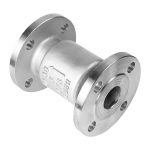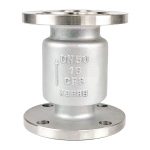TIANYU SS304 Stainless Steel Flanged Check Valve – Energy-Saving Non-Return Valve for Water, Oil, Gas (DN15-DN200, PN16-PN40)
I. Product Overview
II. Key Attributes and Specification Parameters
Design and Dimensional Attributes
- Valve Type: Lift-type check valve (vertical flow) or swing-type check valve (horizontal flow); the image shows a vertical cylindrical design with flanged ends.
- Nominal Diameter Range: DN15 (1/2 inch) to DN200 (8 inches); the sample in the image is DN40.
- Pressure Rating: PN16 (1.6 MPa), PN25 (2.5 MPa), PN40 (4.0 MPa); Class 150, Class 300 (ANSI).
- End Connection: Flanged (RF) per ASME B16.5 (NPS 1/2 to 8) and DIN EN 1092-1 (PN16/PN40); RTJ optional for high-pressure applications.
- Face-to-Face Dimensions: Compliant with GB/T 12221 (China) and ASME B16.10 (USA), ensuring interchangeability with valves from other manufacturers.
Material Specifications
- Body and Bonnet: SS304 (CF8) stainless steel (primary); optional SS316 (CF8M) for enhanced corrosion resistance in harsh environments.
- Disc and Seat: SS304 stainless steel with precision-ground sealing surfaces; optional PTFE/FFKM soft seals for bubble-tight shutoff.
- Spring (if applicable): 316 stainless steel for corrosion resistance; provides controlled opening pressure (0.1–0.3 bar).
- Gaskets and Packing: Spiral-wound gaskets (316SS + graphite) for flanged connections; graphite packing with corrosion inhibitors for stem seals.
Performance and Operational Parameters
- Temperature Range: -29℃ to 425℃ (SS304 body); -29℃ to 180℃ (PTFE soft seals).
- Leakage Class: API 598 Class IV (metal-to-metal seal); Class VI (PTFE soft seal, bubble-tight).
- Flow Coefficient (Cv): 12–350 (varies by size); full-bore design minimizes pressure drop.
- Opening Pressure: 0.1 bar (DN50–DN200), 0.2 bar (DN32–DN40), 0.3 bar (DN15–DN25).
- Cycle Life: ≥100,000 operations under rated conditions.
Testing and Certification
- Design Standards: GB/T 12235, API 598, ASME B16.34, DIN EN 12516.
- Testing Standards: API 598 (shell, seat, backseat tests); ISO 5208 (leakage classification).
- Hydrostatic Testing: Shell test: 1.5× nominal pressure (e.g., 24 bar for PN16); Seat test: 1.1× nominal pressure.
- Certifications: ISO 9001 (quality management); CE (European Conformity); ATEX/IECEx (optional for hazardous areas).
Product Overview
III. Product Features
- Corrosion Resistance: SS304 stainless steel (CF8) resists pitting, crevice corrosion, and oxidation in humid, acidic, or saline environments. This makes the valve ideal for coastal water treatment plants, marine applications, and chemical processing lines where corrosion is a primary concern.
- Energy-Saving Design: The full-bore flow path and streamlined internal geometry minimize pressure loss (≤5% at rated flow), reducing pump energy consumption by up to 15%. In large-scale water distribution systems, this translates to significant operational cost savings.
- Rapid Closure and Water Hammer Prevention: The valve’s disc responds instantly to reverse flow, closing within 0.5 seconds to prevent water hammer—a phenomenon that can damage pipelines and equipment. This feature is critical in high-velocity systems such as fire protection networks.
- Dual-Seal Versatility: Metal-to-metal sealing (SS304) ensures durability and high-temperature tolerance (up to 425℃), while PTFE soft seals provide API 598 Class VI bubble-tight shutoff for clean media like drinking water or pharmaceutical liquids.
- Easy Maintenance and Interchangeability: Flanged connections allow quick removal for inspection or repair. The valve’s compliance with GB/T 12235 and ASME B16.34 ensures it can replace older valves without modifying pipelines, reducing downtime during upgrades.
- Anti-Static and Fire-Safe Options: Optional anti-static devices (≤10Ω resistance between disc and body) dissipate electrostatic charges, preventing ignition in flammable gas applications. Fire-safe designs (per API 607) maintain sealing integrity during combustion, enhancing safety in petrochemical facilities.
IV. Manufacturing Process
- 1. Raw Material Sourcing and Inspection: SS304 (CF8) stainless steel ingots are sourced from certified suppliers and tested via optical emission spectrometry to verify chemical composition (Cr ≥18%, Ni ≥8%). Mechanical testing (tensile, hardness) confirms compliance with ASTM A351 standards.
- 2. Valve Body Casting: The body is produced via investment casting (lost wax process) to achieve a smooth surface (Ra ≤1.6μm) and dimensional accuracy (±0.05mm). This process eliminates porosity, ensuring structural integrity under PN40 pressure.
- 3. Heat Treatment: Cast components undergo solution annealing (1050–1100℃, water quenching) to restore corrosion resistance and soften the material for machining.
- 4. Precision Machining: Critical surfaces (flange faces, seat grooves, disc guides) are machined using 5-axis CNC centers to achieve tight tolerances (±0.02mm). The seat is lapped to a mirror finish (Ra ≤0.8μm) to ensure uniform contact with the disc.
- 5. Seal and Disc Assembly: PTFE soft seals are compression-molded to fit seat grooves and bonded with high-temperature adhesive. Metal seats (SS304) are press-fitted and laser-welded for permanent attachment. The disc is balanced to ensure smooth movement and prevent sticking.
- 6. Spring and Guide Installation: 316 stainless steel springs are calibrated to provide the correct opening pressure (0.1–0.3 bar). Guide pins ensure the disc moves vertically without lateral displacement.
- 7. Flange and Gasket Integration: Flanges are bolted to the body using ASTM A320 L7 alloy steel bolts, torqued to ASME B16.34 specifications. Spiral-wound gaskets are installed to ensure leak-tight flanged connections.
- 8. Pressure Testing (API 598):
- Shell Test: The valve body is filled with water and pressurized to 1.5× nominal pressure (e.g., 24 bar for PN16) for 10 minutes. No leakage or deformation is allowed, verified via ultrasonic leak detectors.
- Seat Test: Air (0.6 MPa) is applied to the inlet, with leakage measured using a bubble counter. Metal-seated valves must meet API 598 Class IV (≤0.15 mL/min for DN40), while PTFE-seated models comply with Class VI.
- 9. Surface Treatment: The valve undergoes passivation in nitric acid (20% concentration) to enhance corrosion resistance. Flanges are shot-blasted to Sa2.5 standard for optimal gasket adhesion.
- 10. Final Inspection and Documentation: Each valve is inspected for dimensional compliance via CMM. Laser marking indicates DN, PN, material, serial number, and certification marks. A complete quality dossier—including material certificates and test reports—is provided.
Valve Details

V. Product Advantages
- Long Service Life in Corrosive Environments: SS304 stainless steel resists corrosion from saltwater, chemicals, and industrial pollutants, extending the valve’s service life to 8–12 years (vs. 3–5 years for cast iron valves). In a coastal desalination plant, this translated to a 70% reduction in replacement costs over a decade.
- Energy Efficiency and Cost Savings: The low-pressure drop design reduces pump power consumption by up to 15%. A municipal water authority reported annual savings of $25,000 after retrofitting 100 valves in their distribution network.
- Minimized Downtime and Maintenance: The valve’s robust construction and easy-access flanged design allow maintenance without removing adjacent pipeline components. A petrochemical plant reduced maintenance downtime by 40% compared to welded check valves.
- Enhanced Safety and Compliance: Optional anti-static and fire-safe features ensure compliance with ATEX and OSHA regulations in hazardous areas. This eliminated $100,000 in potential fines for a gas processing facility.
- Global Project Compatibility: Compliance with GB/T 12235, API 598, and DIN standards allows seamless integration into international projects. A European engineering firm avoided $50,000 in custom adapter costs by using TIANYU’s flanged valves.
Application
VI. Product Applications
- Water Treatment and Distribution: Used in reverse osmosis systems, booster pump stations, and municipal water networks. The valve’s corrosion resistance withstands chlorinated water, while its low-pressure drop maintains flow efficiency in large pipelines.
- Oil and Gas Industry: Deployed in crude oil pipelines, refinery process loops, and natural gas distribution systems. Metal-seated variants handle high temperatures (up to 425℃) in heated oil applications, while PTFE-seated models provide tight shutoff for LPG.
- Chemical Processing: Suitable for non-corrosive to mildly corrosive chemical transfer (e.g., ethanol, ethylene glycol). SS316 optional variants resist acidic media, and the valve’s fire-safe design complies with chemical plant safety protocols.
- Food and Pharmaceutical: Ideal for sanitary applications (e.g., beverage processing, pharmaceutical manufacturing). SS304 meets FDA standards, and PTFE seals prevent product contamination.
- Marine and Offshore: Installed in shipboard cooling systems and offshore platform process lines. The valve’s passivated surface resists saltwater corrosion, and RTJ flanged connections ensure leak-tight performance in rough seas.
RELATED
-

High Temperature/Pressure 304 Stainless Steel Resistant Manual Power Forged Three Piece Flanged Floating Ball Valve
TIANYU 304 Stainless Steel Flanged Floating Ball Valve: Corrosion-Resistant Full-Port Flow Control Solution for Industrial, Sanitary, and Municipal Me…
BALL VALVE 11/03/2025 -

API ANSI 2in-16in DN50-DN400 PN10 PN16 CF8M Pneumatic Flanged Floating Ball Valve
TIANYU CF8M Pneumatic Flanged Floating Ball Valve: 2in-16in (DN50-DN400) PN10-PN16 API/ANSI Class Corrosion-Resistant Flow Control Solution for Indust…
BALL VALVE 11/01/2025 -

Large-Diameter DN1400 CLASS150 WCB SS Triple Eccentric Metal-Sealed Hard Seal Butterfly Valve
TIANYU DN1400 (56″) CLASS 150 WCB Hard Seal Butterfly Valve: Triple Eccentric Metal-Sealed Flanged Valve for Large-Diameter Industrial Media wit…
BUTTERFLY VALVE 10/30/2025 -

PN16 Stainless Steel Floating Ball Valve: Full Port 2PC Flange-Connected Valve with Fire-Safe & Anti-Static SS Ball Valve
TIANYU Stainless Steel Floating Ball Valve: Full Port 2PC Flange-Connected Valve with Fire-Safe & Anti-Static Design for Oil, Gas, and Industrial …
BALL VALVE 10/29/2025 -

High-Performance DN80 Class 150 WCB Soft-Sealed Lug-Type Double Eccentric Butterfly Valve
TIANYU 3” Class 150 WCB lug-type double eccentric butterfly valve is a technologically advanced flow control device engineered to address the challeng…
BUTTERFLY VALVE 10/25/2025 -

DN125 PN16 CF8M Stainless Steel Lug-Type Butterfly Valve with PTFE Lining Concentric Line Butterfly Valves
TIANYU DN125 PN16 CF8M stainless steel lug-type butterfly valve is a precision-engineered flow control device designed to address the challenges of ha…
BUTTERFLY VALVE 10/25/2025







